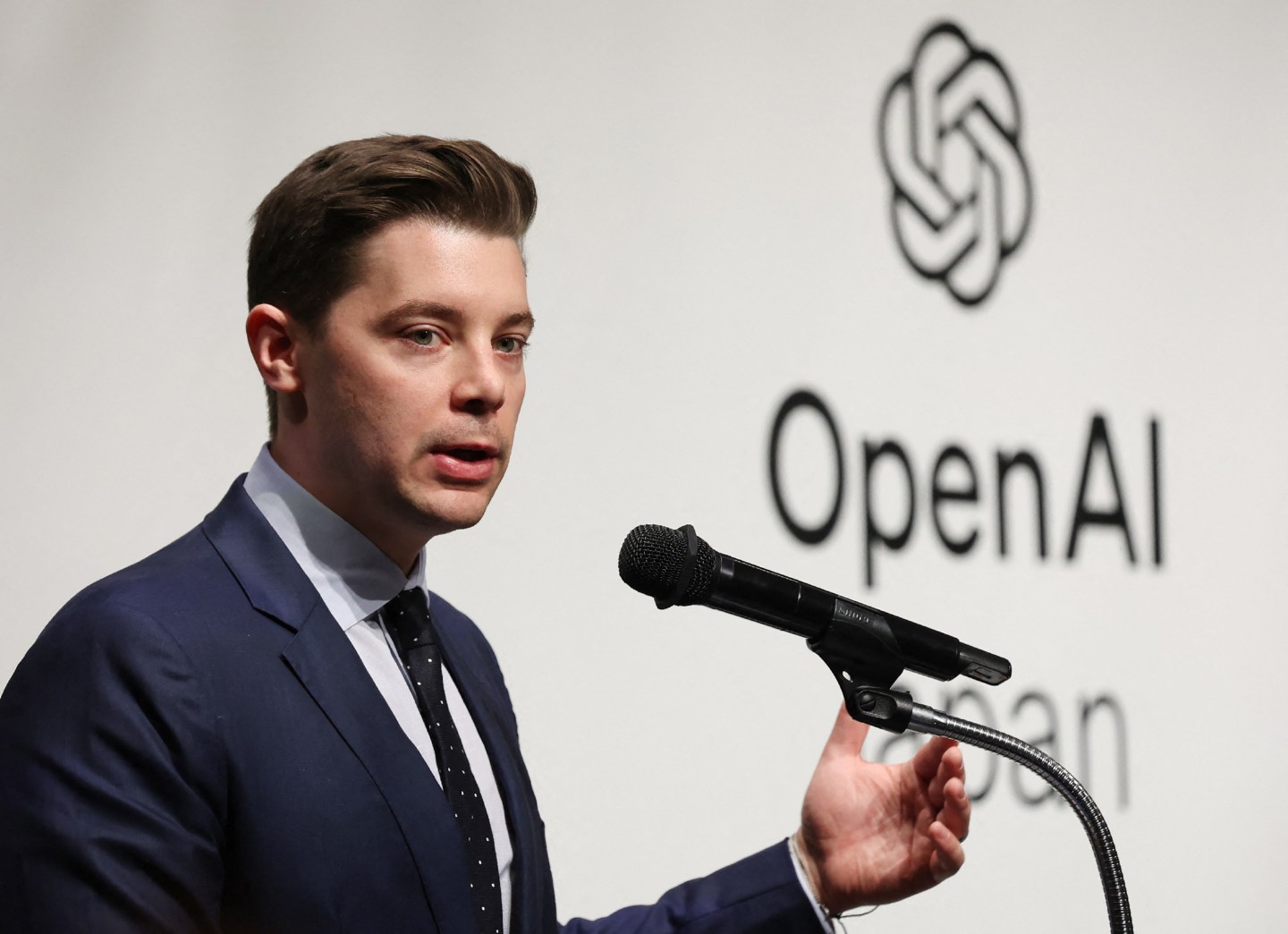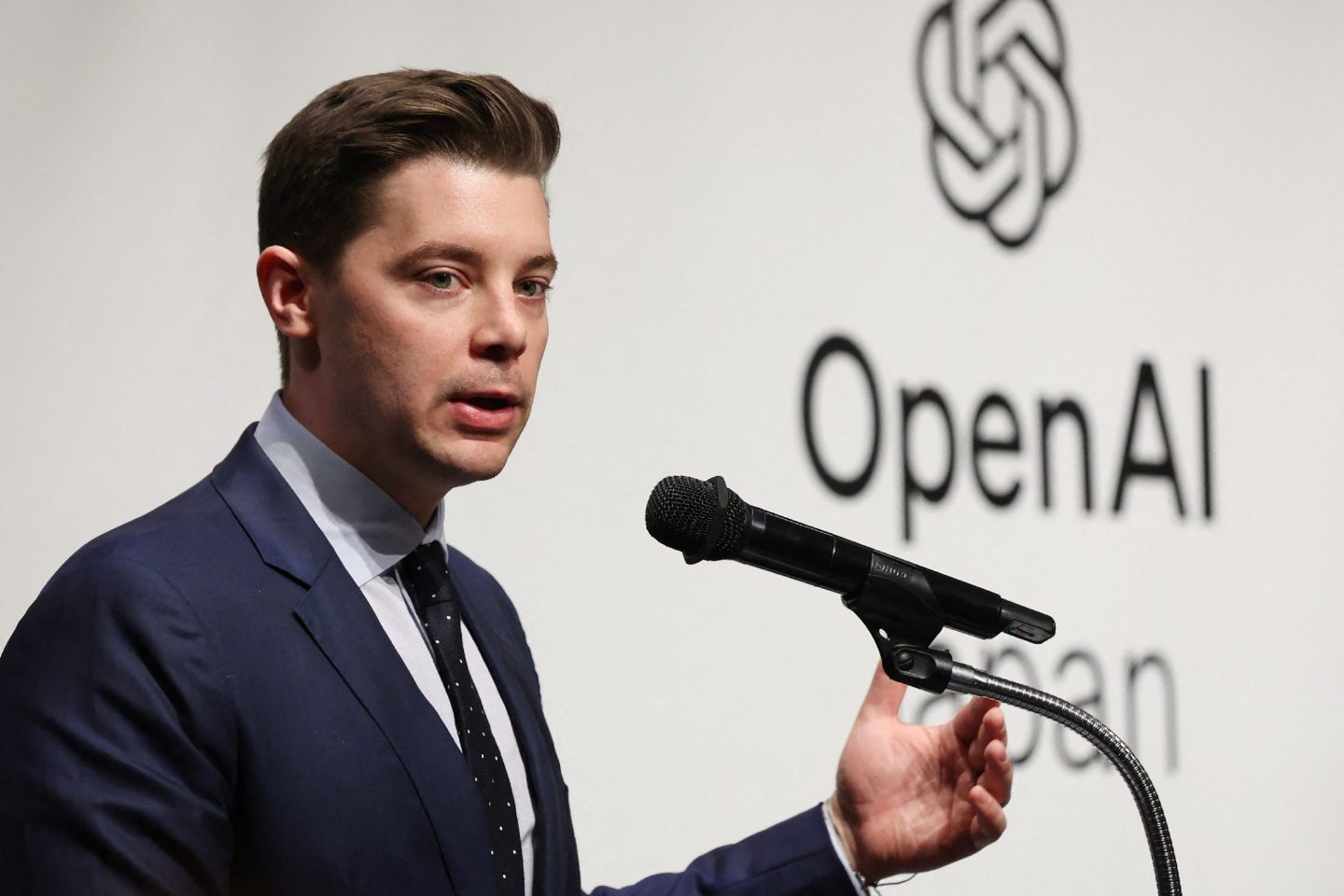Good morning. Thinking of branching out, meeting new people.
Anyone wanna add me to any group chats? No?
Today’s news below. —Andrew Nusca
Want to send thoughts or suggestions to Data Sheet? Drop a line here.
OpenAI’s COO gets an expanded mandate

Could Brad Lightcap become OpenAI’s next chief executive?
The company veteran, who joined—in his own words—a small, “sleepy nonprofit” as CFO in 2018 only to become its COO four years later, has received a promotion…in the form of more responsibility.
OpenAI announced on Monday that Lightcap will now oversee OpenAI’s business and day-to-day operations. (Y’know, CEO stuff.)
“Brad will lead our global deployment, focusing on business strategy, key partnerships, infrastructure, and operational excellence to maximize the impact of our research,” cofounder and CEO Sam Altman wrote in a memo, leaving Altman to focus on research and product.
The memo included two more promotions: Mark Chen will expand his remit as chief research officer to focus on the integration of research and product development, and Julia Villagra will become chief people officer.
But it’s Lightcap’s role that most intrigues as OpenAI turns toward a for-profit structure (with a rumored $300 billion valuation, multiples more than its closest competitor) and continues to scale its operation (it totaled nearly 800 employees by the end of last year) in service of its ambitions.
For one, the COO will now have a greater hand in dealings with tech giants like Microsoft and Apple. He’ll also be better positioned to take bullets for his boss as OpenAI’s profile continues to grow. (Who doesn’t love a Congressional hearing?)
Besides, it’s a grand Silicon Valley tradition: Bill had Steve Ballmer, Steve Jobs had Tim, Mark had Sheryl, Larry and Sergey have Sundar, Elon has Gwynne, Larry Ellison has Safra. For every big thinking tech founder-chief-chair type, there’s a wingman or wingwoman to bring the vision down to earth for everybody else.
And what’s wrong with that? —AN
A former Intel CEO’s next act
What do you do after you’ve been ousted from leading the world’s biggest legacy chip firm for—among other things—failing to harness the AI revolution?
For Pat Gelsinger, the answer is to take over the AI efforts at church-tech outfit Gloo.
Gelsinger, one of the tech world’s most prominent evangelical Christians, has been chairman of Gloo’s board for seven years and an investor for nearly a decade. Now, he’s becoming its tech chief and executive chair.
According to Gloo’s press release, Gelsinger will be “spearheading efforts to build one of the world's first vertical industry clouds for faith and flourishing and advancing values-aligned AI through Gloo AI.”
“Now more than ever, there is great need for faith-based communities to take an active role in ensuring we shape technology as a force for good. As we’ve seen with social media, the impact of technology evolutions is swift, deep and long lasting. AI is an even more powerful yet nascent tool. It is imperative we ensure AI is used to enhance the human experience, not harm it,” Gelsinger wrote in a LinkedIn post.
He also hinted at “more updates to share on this new chapter in the coming days,” not just relating to Gloo.
Intel gave Gelsinger the boot in early December, finally announcing his replacement, Lip-Bu Tan, this month. —David Meyer
Apple AirPods Max gets lossless, lower latency audio
Good news for those of you who ponied up $549 for Apple’s full-size headphones.
The company announced Monday that an April software update will bring lossless audio and ultra-low latency audio to its Airpods Max headphones.
For the audio nerds, that specifically means 24-bit, 48 kHz lossless audio. (For the casual fans: That means audio that sounds fuller, rather than the tin-can vibe that can plague streaming tunes.)
Use of the headphones’ USB-C cable is necessary, though.
Both Apple and Amazon make their audio libraries available in lossless formats at no extra cost; Spotify is expected to do so this year for an additional fee.
“Users can enjoy the highest-quality audio across music, movies, and games,” the company said, “while music creators can experience significant enhancements to songwriting, beat making, production, and mixing.” (Neil Young, you were on to something after all.)
And the lower latency audio? That’s good news for gaming and livestreaming types. Or maybe both. We won’t judge. —AN
More data
—Samsung co-CEO dies from cardiac arrest. Han Jong-hee was 63.
—European firms mull ditching U.S. hyperscalers in the wake of Trump aggression.
—Reid Hoffman on careers in an Intelligence Age: “I don’t think it is AI-proofing yourself; it is AI-amplifying yourself.”
—China bans facial recognition without consent in private spaces like hotel rooms.
—European Commission may fine Meta “up to $1 billion or more” for violating Digital Markets Act.
—eToro files for an IPO. The “social investing” company plans to list on the Nasdaq.
—Alibaba chairman: There’s a data center bubble. Many projects are built without clear customers in mind, Joe Tsai says.
—Critical security flaw in Next.js React framework. It could be exploited to bypass authorization checks under certain conditions.
—11x alleged to claim customers it doesn’t have. The San Francisco sales automation startup is backed by Andreessen Horowitz and Benchmark.














